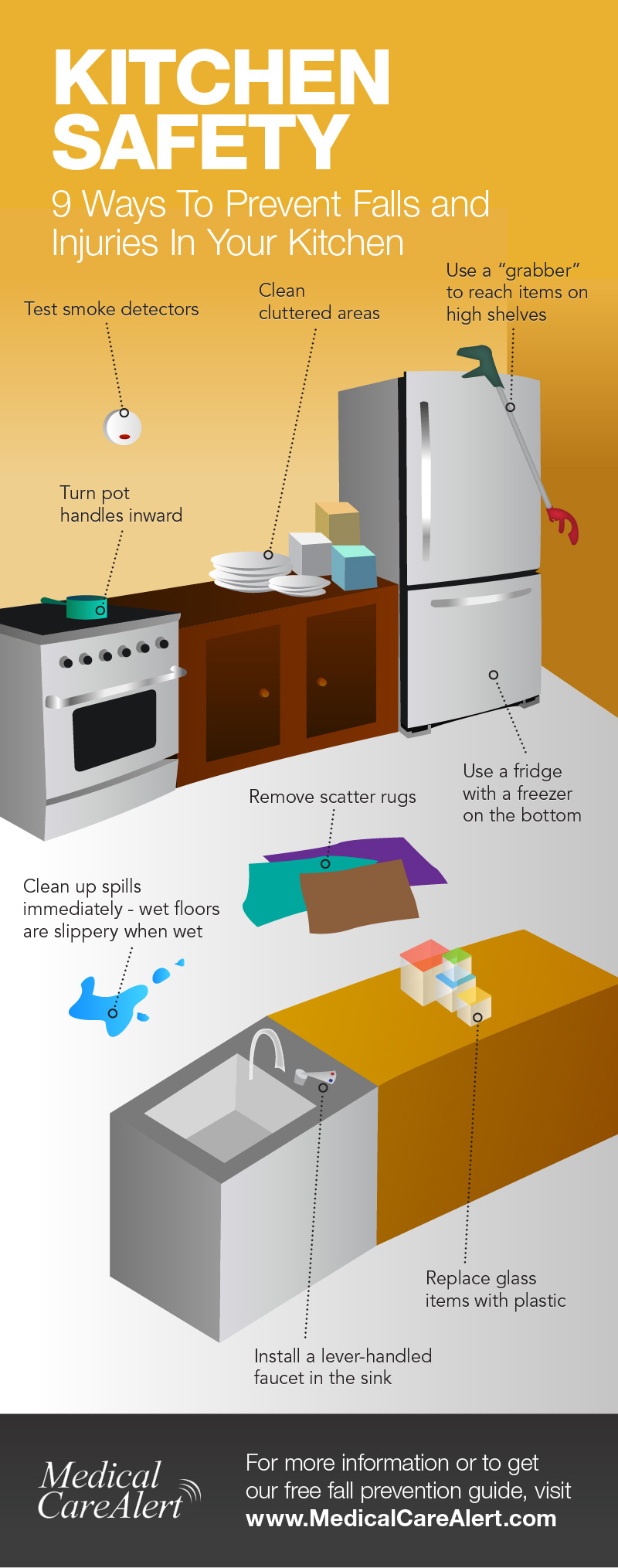Essential Kitchen Safety Tips
The kitchen is the most dangerous room in the house for seniors. Trips, slips, objects falling, and burns are the most common injuries. Fortunately, there are simple things any senior can do to minimize the danger. Our latest infographic shows nine simple things to keep safe and prevent falls in the kitchen. If you want more information about kitchen safety and other home safety tips for seniors, check out our fall prevention guide link at the bottom of the infographic.
The Kitchen Is The 2nd Most Dangerous Room In The House. Our Kitchen Safety Infographic below shows why.
 A great pleasure of life is the ability to cook your own food the way that you want to cook it. Kitchen safety, however, is paramount. A slip here or a cut there can have dramatic consequences for those living alone, especially if they can't call for help.
A great pleasure of life is the ability to cook your own food the way that you want to cook it. Kitchen safety, however, is paramount. A slip here or a cut there can have dramatic consequences for those living alone, especially if they can't call for help.
Aside from getting an emergency alert system, do you have a safe kitchen? Here are some tips to keep your kitchen and family safe:
- Wear a medical alert bracelet. This is your "ace in the hole" if anything goes wrong. If you cut yourself, fall down, or burn yourself, with the medical alert bracelet in place, you can just press the button to get help on the way.
- Make sure that you have light all around the kitchen. This includes your counter-tops, your stove, and your sink. Not being able to see what you're cooking, washing, or cutting opens up the doors to all types of accidents.
- Just like your bathroom, install some night lights in your kitchen. These will help prevent you having to press the button to your emergency alert system because you bumped your head or tripped over something. Night lights are incredibly economical and potentially save nasty falls from happening.
- Always close drawers and cabinet doors when they're not being used. We can't tell you how many times that we've bumped into the edge of a drawer or lightly knocked our head on a door. Heaven forbid that it's bad enough to have to press the button on the medical alert bracelet.
- Consistently clean those counters. Used food, open containers, and other items attract bugs like nobody's business. It only takes a few moments to lower the risks of getting sick from bug-borne bacteria. Would you rather stay healthy or have to use your emergency alert system to call the EMTs?
- Keep the knives and other sharp objects away from the edges of the counters. The knife that we thought was safe gets bumped and comes tumbling down off of the counter. If your reaction isn't fast enough, you could get cut and that means a button push of your medical alert bracelet.
- Avoid wearing baggy clothes. They have the tendency to get caught in appliances or in the flames of gas stoves. Long, loose sleeves are the worst. Aim for short sleeves, if possible, in the kitchen.
- Along that same measure, make sure that pot handles are turned away from the edge of the stove while you're cooking. A little slip, a glance of the hips, and you could have hot food all over you.
- Knives should be properly stored. There's nothing like facing a knife when you're completely unprepared for it. Avoid putting sharp knives into the sink or blade-up in the dishwasher.
There are plenty of other kitchen safety tips out there. We're very interested in hearing from you about the things that you're doing for kitchen safety. 
Infographic provided by Medical Care Alert


